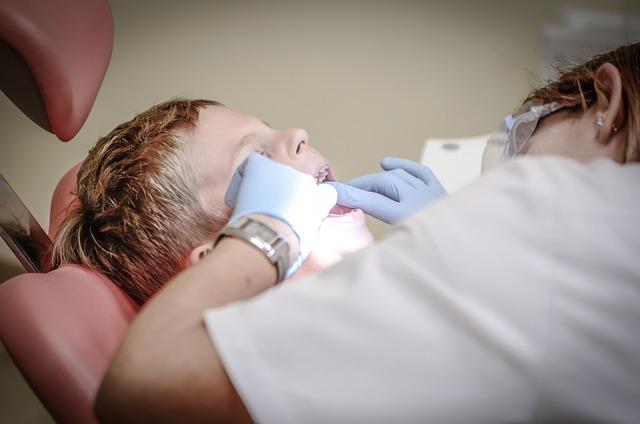Conquer Tooth Infections: Essential Medicine Names You Need to Know
When it comes to tooth infections, knowledge truly is power. Understanding the essential medications necessary to conquer these pesky and often painful conditions can make all the difference in your journey towards a healthier smile. In this article, we will arm you with the names of indispensable medicines that will help you combat tooth infections with confidence and ease. So, gear up as we delve into the world of dental remedies, empowering you with the knowledge you need to conquer tooth infections once and for all.
1. Understanding Tooth Infections: Causes, Symptoms, and Treatment Options
Infections in the teeth can be a painful and concerning issue. Understanding the causes, symptoms, and treatment options for tooth infections is crucial for maintaining good oral health. Here is a comprehensive look at this common dental problem:
Causes of Tooth Infections
- Poor Oral Hygiene: Neglecting proper dental care, such as regular brushing and flossing, can lead to the buildup of plaque and bacteria that can cause infections.
- Tooth Decay: When cavities are left untreated, the bacteria can penetrate the inner layers of the tooth, leading to an infection.
- Cracked or Damaged Teeth: Teeth that are cracked or damaged due to injury or trauma can provide an entry point for bacteria, resulting in an infection.
Symptoms of Tooth Infections
- Severe Toothache: A persistent, throbbing pain in the affected tooth is a common symptom of an infection.
- Sensitivity to Temperature: Tooth infections can cause heightened sensitivity to hot or cold foods and beverages.
- Swelling and Tender Gums: Infections often lead to swollen and tender gums around the affected tooth.
- Bad Breath or Taste: Foul-smelling breath or an unpleasant taste in the mouth can be indicative of a tooth infection.
Treatment Options for Tooth Infections
The appropriate treatment for a tooth infection depends on the severity and extent of the infection. Common treatment options include:
- Root Canal Therapy: This procedure involves removing the infected pulp from the tooth and sealing it to prevent further infection.
- Tooth Extraction: In cases where the infection is severe or the tooth is beyond repair, extraction may be necessary to prevent the spread of infection to surrounding teeth.
- Antibiotics: Prescribed antibiotics may be used to control the infection and reduce pain and swelling.

2. Antibiotics for Tooth Infections: The Key Players in Dental Health
When it comes to dental health, antibiotics play a crucial role in treating tooth infections. These powerful medications are specifically designed to target and eliminate the bacteria causing the infection, providing relief from pain and preventing further complications. Here are some key players in the world of dental antibiotics:
- Penicillin: This widely used antibiotic has been a staple in dental care for decades. It effectively fights a variety of bacteria commonly found in tooth infections, offering quick relief and aiding in the healing process.
- Amoxicillin: Similar to penicillin, amoxicillin is commonly prescribed for dental infections. It has a broader spectrum of activity, making it effective against a wider range of bacteria. This versatility makes it a go-to choice for dentists.
- Clindamycin: In cases where patients are allergic to penicillin or amoxicillin, clindamycin is often the alternative of choice. It is effective against most oral bacteria and is well-tolerated by those with penicillin allergies.
It’s important to note that antibiotics should only be prescribed by a qualified dental professional. They will determine the appropriate medication and dosage based on the severity and type of infection, as well as any potential allergies or interactions with other medications. Additionally, it’s essential to complete the full course of antibiotics as prescribed, even if symptoms improve, to ensure complete eradication of the infection and prevent antibiotic resistance.

3. Amoxicillin: The Go-To Antibiotic for Tooth Infections
When it comes to treating tooth infections, Amoxicillin is often the first choice for many dentists. This powerful antibiotic is highly effective against a wide range of bacteria that can cause tooth infections. Here’s why Amoxicillin is considered the go-to antibiotic:
- Broad-spectrum action: Amoxicillin belongs to the penicillin family and is classified as a broad-spectrum antibiotic. It works by inhibiting the growth of bacteria, making it effective against both gram-positive and gram-negative bacteria commonly found in dental infections.
- High success rate: Numerous studies have shown that Amoxicillin has a high success rate in treating tooth infections. It helps alleviate pain, reduce swelling, and eliminate the source of infection, allowing the body to heal.
- Well-tolerated: Amoxicillin is generally well-tolerated by most patients. It is available in various forms, including capsules, chewable tablets, and liquid, making it suitable for both adults and children.
- Prescribed dosage: Dentists carefully determine the appropriate dosage and duration of Amoxicillin treatment based on the severity of the infection. It is crucial to follow the prescribed dosage and complete the entire course of antibiotics to ensure successful treatment.
While Amoxicillin is highly effective for tooth infections, it is essential to remember that antibiotics should only be taken under the guidance of a healthcare professional. Dentists will evaluate the specific circumstances and consider factors such as allergies or drug interactions before prescribing Amoxicillin or any other antibiotic.
4. Clindamycin: An Effective Alternative for Treating Severe Tooth Infections
When it comes to treating severe tooth infections, Clindamycin has proven to be an effective alternative. This antibiotic medication belongs to the lincosamide class and is commonly prescribed by dentists and oral surgeons. Here are some key points to consider:
- Effective against severe infections: Clindamycin is particularly useful for treating tooth infections that have spread to surrounding tissues or have become abscessed. Its strong antibacterial properties help eliminate the bacteria causing the infection and reduce inflammation.
- Resistant to penicillin: In cases where patients are allergic to penicillin or the infection is resistant to penicillin-based antibiotics, Clindamycin is often the go-to alternative. It is effective against a wide range of bacteria, including those resistant to other types of antibiotics.
- Dosage and duration: The dosage of Clindamycin varies depending on the severity of the infection and the patient’s medical history. It is typically taken orally, with or without food. It is crucial to complete the full course of the prescribed medication to ensure the infection is completely eradicated.
It is important to note that Clindamycin, like any other medication, may have side effects. Common side effects include nausea, diarrhea, and stomach discomfort. It is advisable to consult with a healthcare professional before starting any antibiotic treatment to assess potential risks and benefits.
5. Metronidazole: Uncovering the Power of this Antimicrobial Agent
Metronidazole is an antimicrobial agent that possesses remarkable power in combating various infections. It is classified as a nitroimidazole and works by inhibiting the DNA synthesis of microorganisms, ultimately leading to their death. This versatile drug is widely used to treat a range of infections caused by anaerobic bacteria and certain parasites.
One of the key advantages of metronidazole is its ability to penetrate deep tissues and successfully eradicate infections in areas that are usually difficult to reach. It is highly effective in treating conditions such as bacterial vaginosis, trichomoniasis, and certain types of gastrointestinal infections. Moreover, it has proven to be particularly useful in dental and surgical procedures to prevent post-operative infections.
Metronidazole is available in various forms, including tablets, creams, and intravenous formulations, allowing for flexible administration based on the specific needs of the patient. However, it is important to note that the use of metronidazole should be carefully monitored, as it may cause side effects such as nausea, metallic taste, and even peripheral neuropathy in some cases. It is always advisable to consult a healthcare professional before starting any treatment involving this potent antimicrobial agent.
In conclusion, metronidazole stands as a powerful weapon in the fight against infections caused by anaerobic bacteria and certain parasites. Its ability to penetrate deep tissues, coupled with its versatile administration options, makes it an invaluable tool for healthcare professionals. However, caution must be exercised when using metronidazole, and it is crucial to seek medical advice to ensure safe and effective usage.
6. Penicillin V: A Trusted Antibiotic for Dental Infections
Penicillin V is an antibiotic that has been widely used and trusted for the treatment of dental infections. It belongs to the penicillin group of antibiotics and is highly effective against a variety of bacteria commonly found in dental infections. Here are some key points about Penicillin V that make it a reliable choice for dental practitioners:
– Broad-spectrum coverage: Penicillin V offers broad-spectrum coverage against many gram-positive bacteria, including Streptococcus species and some anaerobic bacteria commonly associated with dental infections. This makes it suitable for a wide range of dental conditions, from mild infections to more severe cases.
– Safe and well-tolerated: Penicillin V is generally safe and well-tolerated by most patients. It is one of the most commonly prescribed antibiotics for dental infections due to its low toxicity profile. Side effects are rare, with the most common being mild gastrointestinal disturbances such as nausea or diarrhea.
– Convenient dosing: Penicillin V is available in various dosage forms, including tablets and oral suspensions, making it easy to administer. The dosing frequency is typically three to four times a day, depending on the severity of the infection. It is important for patients to strictly follow the prescribed dosage and duration of treatment to ensure optimal efficacy.
– Combination therapy: In some cases, Penicillin V may be prescribed in combination with other antibiotics or adjunctive therapies to enhance its effectiveness. Dental practitioners may consider combining Penicillin V with metronidazole for improved coverage against anaerobic bacteria commonly associated with more severe dental infections.
Overall, Penicillin V is a trusted and effective antibiotic for dental infections due to its broad-spectrum coverage, safety profile, convenient dosing, and potential for combination therapy. However, it is essential for dental practitioners to consider individual patient factors, such as allergies or possible drug interactions, when prescribing Penicillin V or any other antibiotic.
7. Augmentin: The Dynamic Duo for Combating Complex Tooth Infections
Augmentin is a powerful antibiotic medication that is widely recognized for its effectiveness in treating complex tooth infections. With its unique combination of amoxicillin and clavulanate potassium, it forms a dynamic duo that can combat even the most stubborn bacterial strains. Here are some key reasons why Augmentin is the go-to choice for dental professionals:
- Broad-spectrum action: Augmentin covers a wide range of bacteria, including both gram-positive and gram-negative strains. This makes it highly effective in treating diverse dental infections, ensuring a comprehensive approach to fighting the infection.
- Enhanced potency: The addition of clavulanate potassium in Augmentin helps overcome bacterial resistance mechanisms. It inhibits enzymes, called beta-lactamases, which are often produced by bacteria to neutralize antibiotics. This allows the amoxicillin component to work more effectively, increasing the chances of successful treatment.
- Reduced treatment duration: Augmentin’s powerful formulation enables faster resolution of complex tooth infections compared to other antibiotics. This means patients can experience relief sooner, minimizing discomfort and promoting quicker healing.
When it comes to combating complex tooth infections, Augmentin stands out as a reliable and efficient treatment option. Its broad-spectrum action, enhanced potency, and shorter treatment duration make it an excellent choice for dental professionals seeking to provide the best care for their patients.
8. Ciprofloxacin: Exploring the Role of Fluoroquinolones in Dental Care
Fluoroquinolones, a class of antibiotics, have gained significant attention in dental care, and one particular member of this class, ciprofloxacin, deserves exploration. Ciprofloxacin exhibits broad-spectrum antimicrobial activity, making it effective against a wide range of bacteria encountered in dental infections.
Here are some key points to consider when exploring the role of ciprofloxacin in dental care:
- Efficiency: Ciprofloxacin has demonstrated high efficacy in treating dental infections caused by susceptible bacteria. Its ability to penetrate bone and soft tissues contributes to its effectiveness in managing odontogenic infections.
- Resistance: While fluoroquinolone resistance is a growing concern, ciprofloxacin still maintains its effectiveness against many bacterial strains commonly found in dental infections. It is crucial, however, to monitor local resistance patterns and prescribe antibiotics judiciously to mitigate the development of resistance.
- Side effects and precautions: Like any medication, ciprofloxacin carries potential side effects, such as gastrointestinal disturbances and tendinopathies, though they are relatively rare. Dentists must exercise caution when prescribing ciprofloxacin, especially in patients with known allergies or specific medical conditions.
By understanding the potential benefits and limitations of ciprofloxacin in dental care, dental professionals can make informed decisions when choosing an appropriate antimicrobial therapy for their patients.
9. Doxycycline: A Broad-Spectrum Antibiotic for Dental Infections
Doxycycline, a powerful broad-spectrum antibiotic, has proven to be highly effective in treating dental infections. This medication belongs to the tetracycline family and is commonly prescribed by dentists due to its wide range of antimicrobial properties.
One of the key advantages of doxycycline is its ability to combat both gram-positive and gram-negative bacteria, making it an excellent option for various dental infections. It works by inhibiting the growth and spread of bacteria, ultimately reducing inflammation and promoting the healing process.
Moreover, doxycycline is known for its extended half-life, allowing for less frequent dosing compared to other antibiotics. This convenience enhances patient compliance and ensures consistent levels of the medication in the body. Dentists often prescribe doxycycline for conditions such as periodontitis, abscesses, and endodontic infections, as it effectively targets the bacteria responsible for these dental ailments.
When considering treatment options for dental infections, doxycycline stands out as a reliable choice. Its broad-spectrum nature, ability to combat various bacteria, and convenient dosing make it an excellent tool in the dental professional’s arsenal. With proper use and adherence to prescribed guidelines, doxycycline can effectively alleviate dental infections and contribute to improved oral health.
10. Choosing the Right Antibiotic: Factors to Consider for Optimal Dental Health Care
When it comes to dental health care, choosing the right antibiotic is crucial for optimal results. There are several factors that need to be considered in order to make an informed decision. Here are some key points to keep in mind:
- Type of Infection: Identifying the type of infection is essential in selecting the appropriate antibiotic. Whether it is a bacterial, viral, or fungal infection, each requires a different type of medication. Consulting with a dental professional is recommended to accurately diagnose the infection.
- Antibiotic Spectrum: Understanding the spectrum of activity of an antibiotic is important. Broad-spectrum antibiotics are effective against a wide range of bacteria, while narrow-spectrum antibiotics target specific types. The choice should be based on the severity and nature of the infection.
- Allergies and Side Effects: It is crucial to consider any known allergies or potential side effects of the antibiotic. Patients with a history of allergic reactions should avoid antibiotics from the same class. Additionally, understanding and managing potential side effects can help ensure a positive treatment experience.
- Resistance: Antibiotic resistance is a growing concern in dental healthcare. It is essential to select antibiotics that are effective against the specific bacteria causing the infection and minimize the risk of developing resistance. This helps preserve the effectiveness of antibiotics in the long run.
By carefully evaluating these factors, patients can make an informed decision when choosing the right antibiotic for their dental health care needs. Remember, consulting with a dental professional is always recommended to ensure the most appropriate treatment plan and optimal oral health outcomes.
Frequently Asked Questions
Q: What are some essential medicines to conquer tooth infections?
A: There are several medicines that can effectively conquer tooth infections. Here are some essential names you need to know.
Q: What is the first recommended medicine for tooth infections?
A: Amoxicillin, an antibiotic, is often the first line of treatment for tooth infections. It works by inhibiting the growth of bacteria, providing relief from pain and inflammation.
Q: Are there any alternatives to amoxicillin?
A: Yes, in case of allergies or intolerances to amoxicillin, dentists may prescribe clindamycin, another antibiotic that effectively fights tooth infections.
Q: How long should I take the prescribed antibiotics?
A: The duration of antibiotic treatment varies depending on the severity of the infection. Typically, dentists recommend taking antibiotics for 7 to 10 days, as prescribed, to ensure complete eradication of the infection.
Q: Are there any over-the-counter pain relievers that can help with tooth infections?
A: Yes, nonsteroidal anti-inflammatory drugs (NSAIDs) such as ibuprofen and aspirin can provide temporary relief from toothache and reduce inflammation caused by the infection.
Q: Can I use topical antiseptics to treat tooth infections?
A: While topical antiseptics like benzocaine can temporarily numb the area and provide short-term relief, they do not treat the underlying infection. Therefore, it is important to consult a dentist for proper diagnosis and treatment.
Q: Is it necessary to take antibiotics if I have a tooth infection?
A: In most cases, antibiotics are necessary to eliminate the infection and prevent it from spreading. However, the final decision should be made by a dental professional after evaluating the severity of the infection.
Q: How can I prevent tooth infections?
A: Maintaining good oral hygiene is crucial to prevent tooth infections. This includes regular brushing and flossing, along with routine dental check-ups. Additionally, avoiding sugary foods and beverages can also help reduce the risk of tooth infections.
Q: Can natural remedies be effective against tooth infections?
A: While natural remedies like saltwater rinses and clove oil may provide temporary relief, they are not a substitute for proper dental treatment. It is important to consult a dentist for professional advice and appropriate medication.
Q: Are there any other medications that can be used to treat tooth infections?
A: In some cases, dentists may prescribe additional medications such as analgesics or steroids to manage pain and reduce inflammation associated with tooth infections. These should always be taken as directed by a dental professional.
The Way Forward
In conclusion, conquering tooth infections is crucial for our overall dental health. By being aware of essential medicine names, we can effectively combat these infections and alleviate the associated pain and discomfort. Remember, antibiotics like amoxicillin and metronidazole are commonly prescribed to target the underlying bacteria, while ibuprofen and acetaminophen can provide temporary relief from the pain. Additionally, don’t overlook the importance of maintaining good oral hygiene practices and visiting your dentist regularly. With this knowledge, you can confidently address tooth infections, ensuring a healthier smile for years to come.






